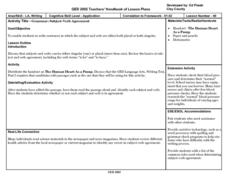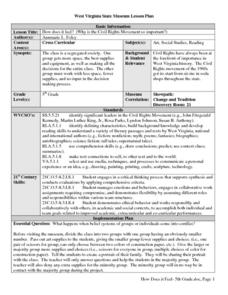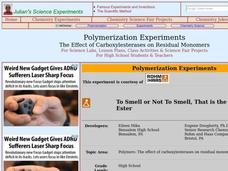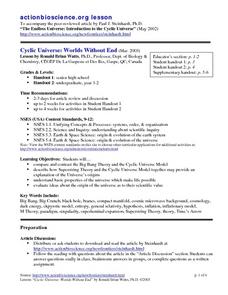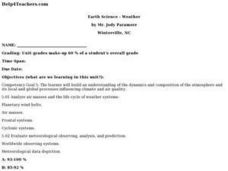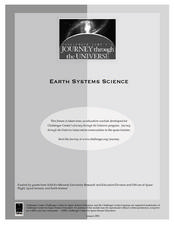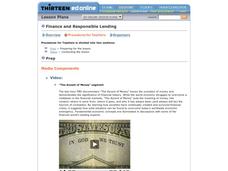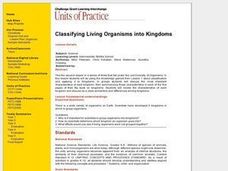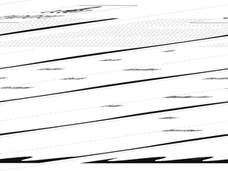Curated OER
Grammar- Subject-Verb Agreement
Students practice writing sentences in which the subject and verbs are either both singular or plural. They complete worksheets including one highlighting "The 5-Step Subject- Verb Edit Process.
Curated OER
Outdoor Survival
Students are introduced to basic outdoor survival concepts. They identify the seven basic needs for survival. Students describe the symptoms and treatment for frostbite and hypothermia. They compare and contrast the value of different...
Curated OER
How does it feel? Why is the Civil Rights Movement so Important?
Fifth graders study the Civil War. In this US history lesson, 5th graders simulate what life was like during the Civil War by having two groups with one group given more materials than the other group. Students then draw a...
Curated OER
Polymerization Experiments
Students explain the process of polymerization. In this chemistry lesson, students produce carboxylesterase in the lab. They test its effectiveness in removing the by-product odor.
Curated OER
Plants and Animals Depend Upon One Another
First graders study plants and animals and how they depend on one another. They also study that plants give energy to animals and provide oxygen needed for life. Finally, 1st graders give examples of the roles plants and animals play...
Curated OER
Gene Regulation Mechanisms
Students explore the control of expression of DNA into proteins which is divided into two main categories: transcriptional and post-transcriptional. They construct examples of the control mechanisms and discuss disease processes that...
Curated OER
Vermicomposting
Fourth graders explore insect life by viewing a soil presentation in class. In this composting lesson, 4th graders read assigned text about the process of composting soil and the necessity of soil in plant life. Students view video clips...
Curated OER
Cyclic Universe: Worlds Without End
Young scholars compare and contrast the Big Bang Theory and the Cyclic Universe Model. They explain basic properties of the univers which make life possible. They evaluate ideas about the origin of the universe as to their scientific value.
Curated OER
What Beautiful Caterpillars!
Second graders investigate the life cycle of the caterpillar. They create a caterpillar habitat and care for it. Students make daily observations that are recorded in a writing journal. During the process of observation the students...
Curated OER
Time Management
Young scholars are taken through the design process to develop a system of time management for themselves and others. They practice participating in a critique of other students' time schedules and modify and improve their initial time...
Curated OER
Cell Growth and Division
Students explore the cell cycle. They examine why the cell cycle is necessary. Students discuss the processes of interphase and mitosis. They explore the general phases of mitosis; prophase, metaphase, anaphase and telophase.
Curated OER
Earth Science - Weather
Young scholars build an understanding of the dynamics and composition of the atmosphere and its local and global processes influencing climate and air quality. They analyze air masses and the life cycle of weather systems.
Curated OER
Earth Systems Science
High schoolers perform experiments designed to grow plants and bacteria in a controlled environment. In this ecosystems activity students investigate varying conditions for growing plants and bacteria.
Curated OER
What did T. rex taste like?
Learners examine the three domains of life and explain that all living things share a common ancestor. In this paleontology lesson students are introduced to the process of illustrating evolutionary relationships.
Curated OER
The Birth of a Rocky Mountain City and Railroad: Georgetown and the Loop Railroad
Students explore the evolution of a town. In this social studies lesson, students discuss why Georgetown and the Georgetown Loop Railroad were developed and discuss life as a prospector. Students write a letter explaining what life is...
Curated OER
Finance and Responsible Lending
Students learn the characteristics of economic systems through problem solving, communication and representation. In this financial lending lesson, students use math to solve problems dealing with the economy today, to work with their...
Curated OER
Classifying Living Organisms into Kingdoms
Students create a flip book that describes the basic characteristics of the five main animal kingdoms. They research the animal kingdoms, include examples of organisms for each kingdom and illustrate the finished text.
Curated OER
Check It Out
Students discuss the many processes involved with personal banking. They create their own budget based on their career choices. They also practice balancing a checkbook.
Curated OER
Social Studies: Cooking Methods - Past and Present
Fourth graders identify geographic regions (Texas' Edwards Plateau) and sequence steps in the hot rock cooking process. They compare and contrast prehistoric and contemporary cooking methods. Students conduct online research and record...
Curated OER
Natural Disaster Risk at Home
Students analyze the natural disater threat and potential mitigation techniques of their (parents?) home. They apply classroom knowledge to students, non-academic daily life. Students recongize how earth processes specifically affect...
Curated OER
Ratios, Proportions, and Percents
Eighth graders use ratios and proportions to solve real-life problems. In this using ratios and proportions to solve real-life problems lesson, 8th graders estimate the cost of a road trip. Students estimate the distance...
Curated OER
What is a Karst?
Students examine the process that creates limestone. In this limestone lesson students complete a worksheet and participate in a lab activity.
Curated OER
Using Algebra to Solve Puzzles
Young scholars explore basic algebraic operations to solve real life situations. Additional problems are presented to continue the exploration of the concept.
Curated OER
Hunters/Gatherers
Young scholars discuss the ways in which an environment is used to provide the basic necessities of life. In groups, they compare and contrast how different hunter and gatherer groups have used the environment to their advantage. They...


